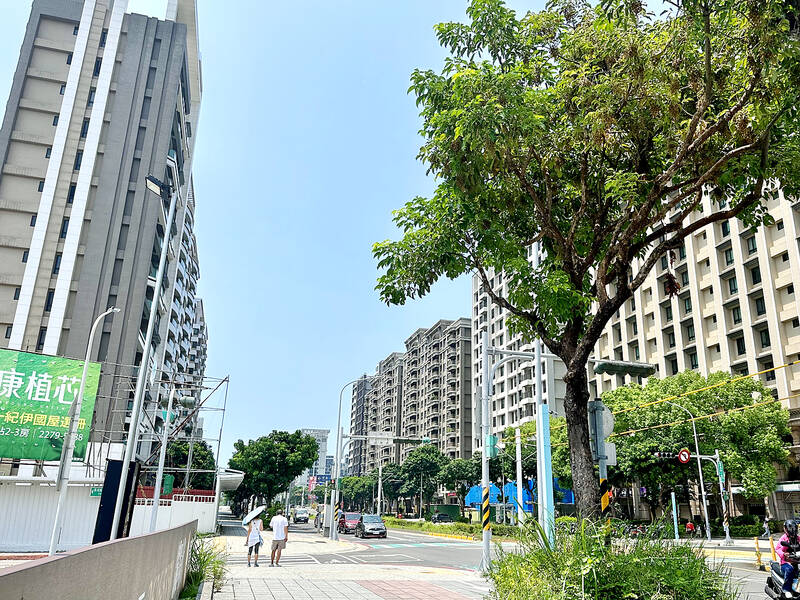The nation’s five major state-run banks extended NT$111.046 billion (US$3.46 billion) in new mortgages last month, up NT$14.305 billion from the previous month and returning above the NT$100 billion mark, central bank data released yesterday showed.
The figure had fallen below the NT$100 billion mark in August for the first time in four months as the central bank continued its efforts to cool the domestic housing market and contain real-estate speculation and property hoarding.
The 14.79 percent monthly increase in new mortgages by the Bank of Taiwan (臺灣銀行), Land Bank of Taiwan (土地銀行), Taiwan Cooperative Bank (合作金庫銀行), Hua Nan Commercial Bank (華南銀行) and First Commercial Bank (第一銀行) last month stemmed from a higher number of whole-batch mortgage cases compared with the previous month, the central bank said.

Photo: Hsu Yi-ping, Taipei Times
In addition, several local lenders accelerating their processing of previously accumulated first-time purchases and owner-occupied units also pushed up the new mortgage figures, it said.
However, it would require further observation to determine whether last month’s increase was a short-term phenomenon, as various data released recently showed that the housing market has cooled down slightly compared with the hot market in the first half of the year, it added.
Despite the growth in new mortgages, the average mortgage rate charged by the five state-run banks declined 0.004 basis points from 2.194 percent in August to 2.19 percent last month, mainly due to the higher proportion of first-time purchases and owner-occupied cases, which usually come with more favorable rates from lenders, the central bank said.
It also reflected a declining proportion of the government’s preferential loans for first-home buyers in the total new mortgages, which fell to 34.37 percent last month, the lowest since September last year, the central bank said.
Since the government’s preferential loan program carries relatively lower interest rates, a lower proportion of such loans affected the average mortgage rate less than expected, it said.
During the first nine months of this year, the five state-run banks extended NT$880.771 billion of new mortgages, a record for the period and up 76.4 percent from NT$499.296 billion a year earlier, the data showed.

Vincent Wei led fellow Singaporean farmers around an empty Malaysian plot, laying out plans for a greenhouse and rows of leafy vegetables. What he pitched was not just space for crops, but a lifeline for growers struggling to make ends meet in a city-state with high prices and little vacant land. The future agriculture hub is part of a joint special economic zone launched last year by the two neighbors, expected to cost US$123 million and produce 10,000 tonnes of fresh produce annually. It is attracting Singaporean farmers with promises of cheaper land, labor and energy just over the border.

US actor Matthew McConaughey has filed recordings of his image and voice with US patent authorities to protect them from unauthorized usage by artificial intelligence (AI) platforms, a representative said earlier this week. Several video clips and audio recordings were registered by the commercial arm of the Just Keep Livin’ Foundation, a non-profit created by the Oscar-winning actor and his wife, Camila, according to the US Patent and Trademark Office database. Many artists are increasingly concerned about the uncontrolled use of their image via generative AI since the rollout of ChatGPT and other AI-powered tools. Several US states have adopted

A proposed billionaires’ tax in California has ignited a political uproar in Silicon Valley, with tech titans threatening to leave the state while California Governor Gavin Newsom of the Democratic Party maneuvers to defeat a levy that he fears would lead to an exodus of wealth. A technology mecca, California has more billionaires than any other US state — a few hundred, by some estimates. About half its personal income tax revenue, a financial backbone in the nearly US$350 billion budget, comes from the top 1 percent of earners. A large healthcare union is attempting to place a proposal before

KEEPING UP: The acquisition of a cleanroom in Taiwan would enable Micron to increase production in a market where demand continues to outpace supply, a Micron official said Micron Technology Inc has signed a letter of intent to buy a fabrication site in Taiwan from Powerchip Semiconductor Manufacturing Corp (力積電) for US$1.8 billion to expand its production of memory chips. Micron would take control of the P5 site in Miaoli County’s Tongluo Township (銅鑼) and plans to ramp up DRAM production in phases after the transaction closes in the second quarter, the company said in a statement on Saturday. The acquisition includes an existing 12 inch fab cleanroom of 27,871m2 and would further position Micron to address growing global demand for memory solutions, the company said. Micron expects the transaction to